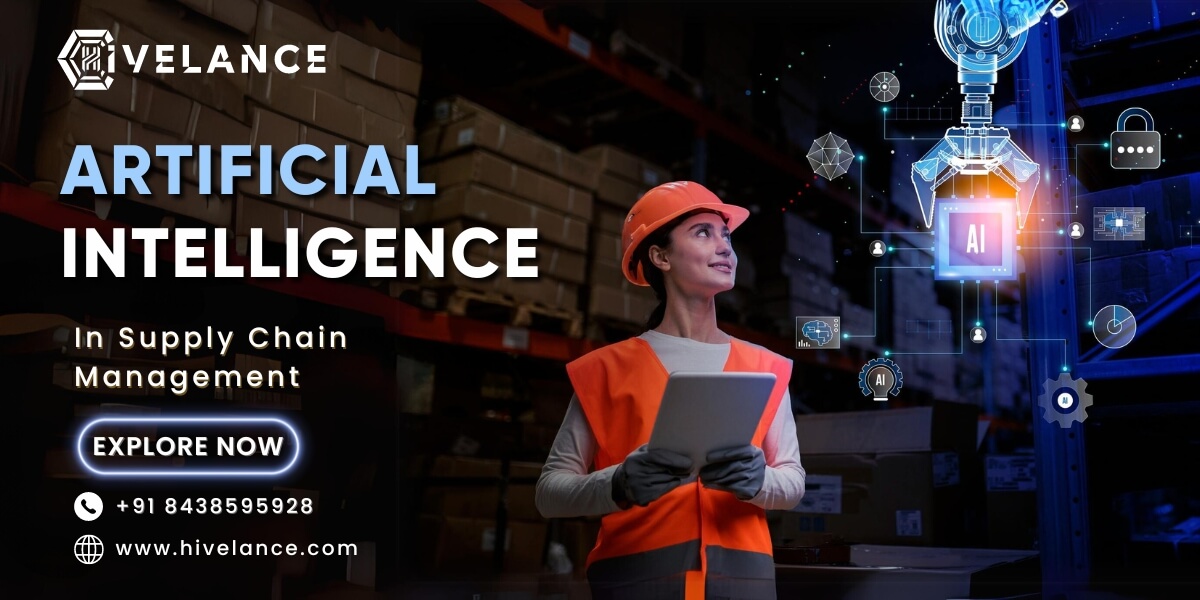How AI Improves The Supply Chain Management field ?
AI in Supply Chain Management
To put it simply, supply chain management encompasses all the processes involved in locating, manufacturing, and shipping items. The industry will choose the specifics. For instance, Supply chains for manufacturing concentrate on the process of locating raw materials to provide the end product.
However, how is AI related to any of the above ?
The simulation of human intelligence is called artificial intelligence. That is what sets it apart from a typical computer algorithm. Large volumes of data are ingested by AI, which then utilizes it to make precise predictions. Supply chain management and logistics are just two of the many industries where this has proven incredibly viable in a more data-rich environment.
In this blog , you might know more about AI in the supply chain management field.Now let's examine the effects of AI on supply chains from a business perspective. Furthermore, we will examine how incorporating AI development services into your business will enable employees, equipment, and software to operate together.
Perks of AI in Supply Chain Management
Enhanced Effectiveness and Financial Savings
AI can assist logistics organizations in determining the most economical and effective method for completing any assignment.
As examples, let's look at some repetitive tasks: routing, transportation and inventory. Humans may need to spend several hours a day on these duties. Conversely, AI can do the task in a matter of seconds. As a result, human effort may now be concentrated on tasks unique to humans. Both ROI and worker productivity are increased as an outcome.
Greater Visibility and Transparency
Things can easily get lost in the shuffle when a supply chain spans the entire world. Delivery personnel are misplaced and lost. Logistical delays are caused by nature. The incorrect container is labeled with the incorrect shipping label.
AI helps to reduce these issues by quickly and efficiently gathering large volumes of logistical data and presenting it in a human-readable format. This covers a lot of information, such as estimated delays and shortages, inventory locations, and shipment schedules. Organizations may now examine the full extent of their supply chain for the first time in history.
Enhanced Contentment with Clients
The modern customer demands speedy delivery, as we have stated. This holds true for both B2B clients and private consumers. AI enables logistic companies to live up to that standard.
And that's without even talking about chatbots for customer support that can quickly respond to queries from users instead of making them wait hours on hold to talk to a busy agent.
Ways Artificial Intelligence improves the Supply Chain Management field
Studies have shown that artificial intelligence can offer supply chain and logistics operations unmatched benefits. AI is starting to be preferred by businesses worldwide for supply chain management and optimization.
Artificial Intelligence (AI) is becoming indispensable in supply chain management, whether the goal is to reduce costs by doing away with operational redundancies and risk, mitigate needless risk, enhance supply chain forecasts, deliver goods more quickly and effectively, or reinvigorate customer service strategies.
In particular, AI is causing quite a stir in the creation of demand forecasting models, enhancing end-to-end transparency, incorporating business planning, producing dynamic business optimization models, and, naturally, significantly enhancing physical flow automation.
1. Demand Prediction Models
Sustaining ideal stock levels is essential in the complex field of supply chain management in order to avoid shortages or excess inventory. Accurate demand prediction in the future is mostly dependent on AI algorithms that make use of past data, industry patterns, and outside influences. By taking a proactive stance, businesses may quickly resolve inventory-related issues and maintain a flexible supply chain that adapts to changing customer demands.
For instance, AI systems are excellent at predicting product life cycles, identifying possible dips, and planning end-of-life strategies for sales channels. Businesses may demonstrate the revolutionary influence of AI on demand forecasting by extending the life cycle of their offers by smoothly transferring to models for upcoming products.
2. End-to-End Transparency
To put it mildly, Global supply chain projections at this time are convoluted. Having complete supply chain visibility is more important than ever for manufacturers. The way their products are assembled, the quantity being manufactured, and the amount being delivered out must all be instantly visible to manufacturers.
AI-driven solutions improve transparency and enable prompt reactions to disruptions by providing real-time information across the whole supply chain. An agiler and more responsive supply chain is fostered by this increased visibility, which facilitates the discovery of bottlenecks and inefficiencies. Supply chain management utilizing artificial intelligence could achieve all of this by absorbing and interpreting real-time data from various supply chain layers in addition to using past data.
3. Integrated Business Planning
The inability of supply chain managers to view in real-time, recognize variations in expanding product portfolios, understand changes in customer demand trends, and remain informed about unforeseen occurrences such as factory shutdowns and transportation problems makes it difficult for them to properly optimize a supply chain.
For example, Transportation routes can be optimized using AI algorithms to save expenses and lessen their negative effects on the environment. This promotes sustainable and environmentally friendly supply chain methods in addition to increasing the effectiveness of delivery procedures.
4. Dynamic Planning Optimization
AI's capabilities go beyond integrating corporate plans; it can also produce cognitive forecasts and supply chain planning recommendations. This innovation reduces errors in the planning process and avoids complicated manual business models, which saves businesses a great deal of time. Artificial intelligence (AI)-enabled supply chain software highlights important elements, streamlining procedures and helping producers assess scenarios in terms of income, cost, and time.
5. Physical Flow Automation
AI makes sure that material invoices and purchase order data are correctly organized and filed. This enables field operators with data-driven insights to maintain ideal inventory levels in addition to facilitating real-time predictions. Sophisticated artificial intelligence algorithms use physical sensors and computer vision to monitor and adjust supply chain operations while continuously maintaining an accurate inventory spreadsheet.
AI systems may detect when replenishment is necessary by keeping an eye on product availability on store shelves, comparing inventory levels, and reacting to spikes in demand. This is an advanced kind of automation. As a result, fewer manual inventory counts are required as often.
For example, keeping an eye on the merchandise on the shelves and comparing it to the demand currently being expressed for the product with the remaining product inventory. If demand is strong and the inventory is getting low, an active reorder of the goods will be placed.
Future scope
According to Gartner's estimates, we might anticipate the following trends within the coming years:
- In their warehouses, 75% of large businesses will have implemented "intralogistics smart robots" by 2026.
- By 2026, artificial intelligence will be integrated into the products of more than 75% of commercial supply chain management application providers.
- Applications with AI support will be funded by 50% of supply-chain businesses.
Furthermore, these forecasts are just for the upcoming few years. But the options appear to be virtually limitless.
Get Your Supply Chain Ready for the Future with Hivelance
AI's advantages for supply chain management are invaluable. These days, AI is a standard technology for the supply chain since businesses of all shapes and sizes have embraced its wide range of uses. In light of the current situation, supply chain AI solutions must be thoroughly incorporated into every supply chain business in order to optimize it.
Consequently, it's imperative that you select Hivelance's data analytics services to help you extract insightful knowledge from your business data for optimal scalability and performance if your supply chain company lacks the sophisticated solutions mentioned above. We can provide the best services to enable your business from supply chain analytics and data visualization to data warehousing and business intelligence solutions.
Engage with our development team to learn more about the advantages of artificial intelligence for your supply chain business.
 Trends
Trends
 Crypto
Crypto
 Web 3.0
Web 3.0
 AI
AI
 Blockchain
Blockchain
 Fintech
Fintech
 Company
Company


















